Were occult practices behind India's 'house of mass hangings'?
- Published
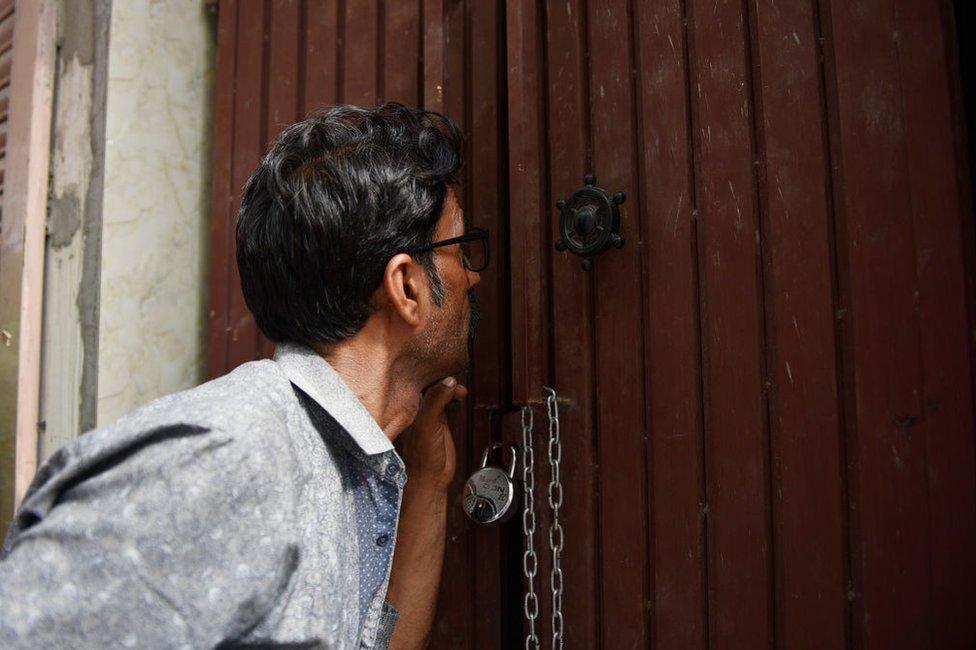
A man tries to peep inside the Chundawat residence where 11 members of the family were found dead
Burari, a non-descript neighbourhood in the Indian capital Delhi, attained notoriety after 11 members of the Chundawat family were found dead inside their home, amid whispers of occult practices and mass suicide. BBC Hindi's Salman Ravi tries to find out more about the family and their final hours.
The tiny lane where houses stand cheek by jowl is filled with journalists, policemen, politicians, social workers and curious onlookers. They are all congregating outside the first house in the row which some whisper is "haunted".
This is the three-storey house where neighbours found the bodies of the Chundawat family on 1 July.
By all accounts, the Chundawats were the quintessential average Indian extended family. They had lived in the area for 20 years and were active members of the community.
Police say 10 of them were hanging from the ceiling of their home. Their hands were tied behind their backs, and their eyes and mouths were covered with cloth.
The 11th body, of oldest family member 75-year-old Narayan Devi, was lying on the bed in the next room.
Belief in the occult
Although police have not ruled out the possibility of murder, investigations so far seem to point to a "mass suicide" which they say may have been influenced by some family members' belief in the occult.
Police have zeroed in on one of the men in the family, identified as Lalit Chundawat.
They suspect he believed he was "possessed by the spirit" of his father, who died in 2008.
"My children told me that the Chundawat children often told them that their uncle was possessed with the spirit of their grandfather," said a neighbour, Sandeep, who lives down the road and did not wish to reveal his last name.
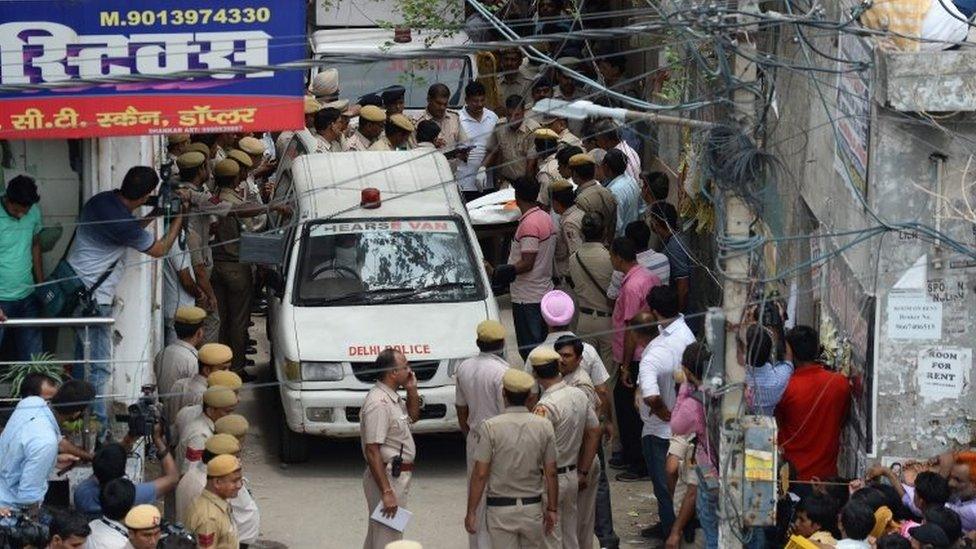
Documents and mobile phones recovered from the house also hinted at Lalit's interest in "spirits and ghosts". Police also believe that he frequently visited crematoria and obsessively watched paranormal shows on the internet.
Lalit had reportedly lost his ability to speak after a pile of plywood sheets fell on his head some three years ago. But recently he had started to speak again.
Some neighbours told the BBC that the family had told them Lalit's "cure" was a miracle, although others disputed this.
They said the family told them it was due to medical treatment.
Police believe he was the instigator of the mass suicide, based on their discovery of 11 diaries which they think belonged to him.
A 'hanging manual'
"Notes found in one of the diaries hint that a strong belief that supernatural forces would intervene and save them could have motivated the family to hang themselves," an investigating officer has said.
The notes in the diaries laid out exactly how the family needed to "hang themselves" before they were to be saved. Many of these "instructions" appear to have been carried out.
They referred to Thursday or Sunday as the "chosen" days. Police believe the deaths occurred between late Saturday night and early Sunday.
The diaries also said the family needed to cover their eyes and mouths with a cloth during the "ritual".
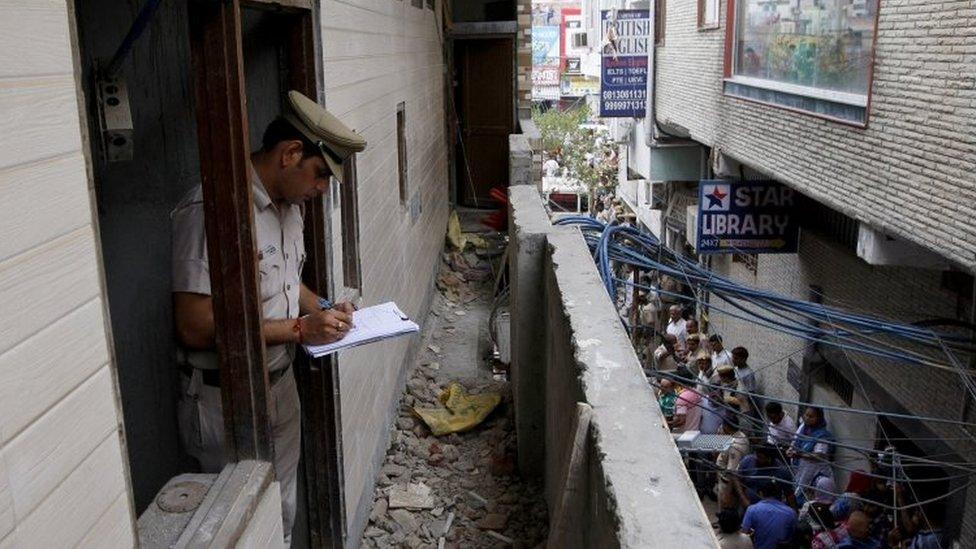
Police have found 11 diaries that they say spelled out instructions for the hangings
It also specified certain rituals to be performed for seven consecutive days before the "final day". The rituals, it said, would "invoke the spirit" which would ask them to "complete" the task the following day.
The notes also said that his mother, Devi, should be "made to go to sleep" in the next room if she "can't stand".
It mentioned the time of the "final act" - between midnight and 1am. It also said on that day the "earth would tremble and the sky would shake and it is then that I will come to rescue you".
The 'shared psychosis' theory
Police said they are still trying to understand if or why the rest of the family went along with the plans.
They believe it is possible that the Chundawat family was suffering from "shared psychotic disorder" - psychiatrists say that people who are in a close relationship with someone who is delusional (sometimes termed the "inducer" or "the primary case") may develop similar delusions.
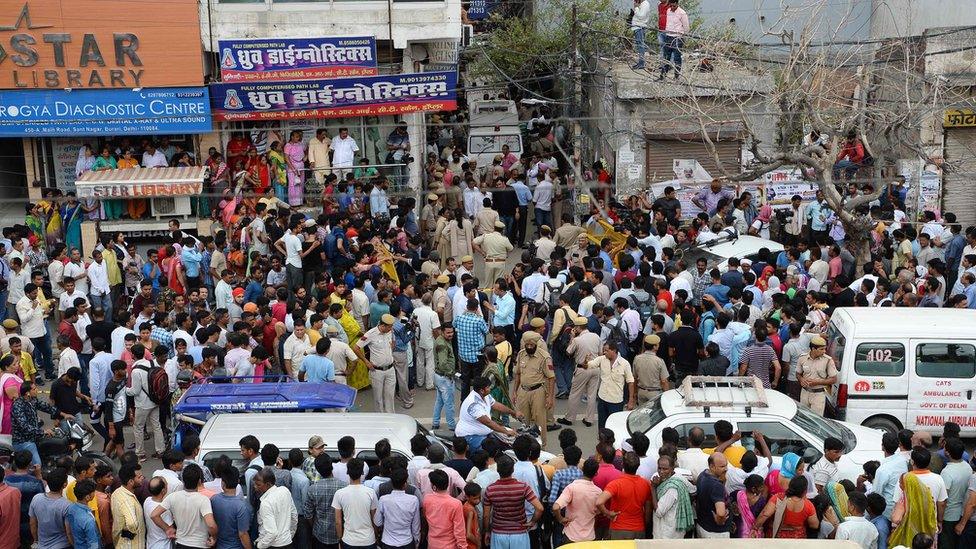
The neighbourhood was swarming with onlookers when the news of the deaths emerged
They are currently collecting information about the deceased with the help of structured interviews with relatives, friends and neighbours, to see if they can figure out if this was the case.
But members of the family who did not live in Burari have challenged this theory and say that some of the handwriting in the diaries does not match Lalit's.
Police have countered this, saying some of the notes could have been written by Lalit's niece Priyanka.
However, Priyanka's cousin Vishakha disputed this. Priyanka had recently got engaged and had been excited about her wedding, Vishakha says.
Could it have been murder?
The family had thrown a large party to celebrate, inviting many people in the area. One video of the family on social media showed them all dancing together at the event.
"They never had any problems with anyone. We never saw them fighting," one of their neighbours, TP Sharma, said.
In fact, many of the neighbours insist that it is highly unlikely the family killed themselves. They say they had absolutely no inkling that anything was amiss.
The Chundawats ran two shops on the ground floor of their home - one sold groceries and the other plywood.
Many locals are tired of weeks of media attention and want to be left alone, but neighbours the BBC spoke to said the family were active members of the community and well liked.
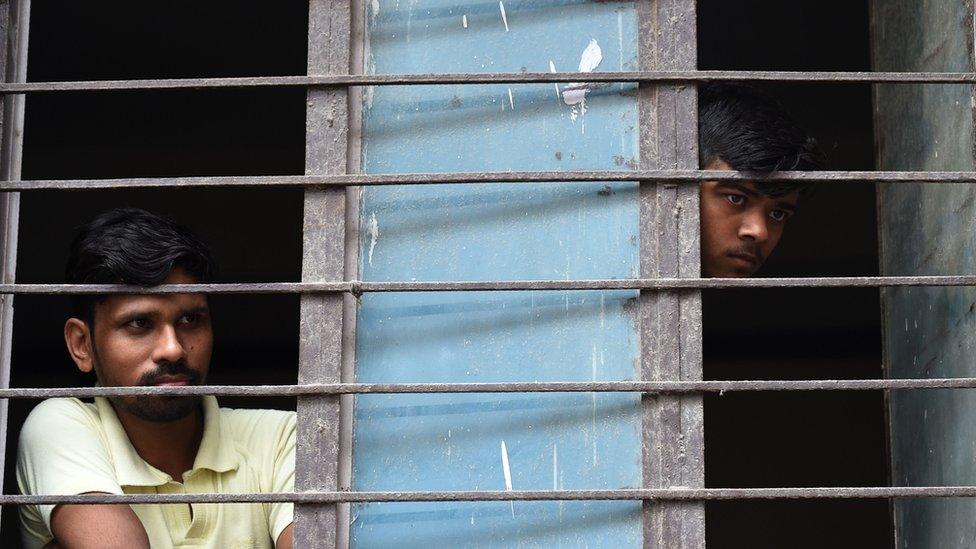
The neighbourhood of Burari is reeling from the deaths of the family
Some of them said they felt guilty that they "could not do anything" to save the family.
"We feel helpless. Had we known what the police are claiming, we would have intervened," says Sri Ram, 70, who knew the family since they moved into Burari 20 years ago.
But this still does not explain why no-one heard anything on the night that the family died.
An elaborate plan?
"There was no unusual activity at the house that could have led to any suspicion that anything was going wrong at the Chundawats. Everything seemed to be normal till late in the evening. Eleven people died and there was no sound at all. This is something strange. They were normal people," said Nihal Singh, who lives in Burari.
The post mortem reports say all 11 members of the family died by hanging, including Narayan Devi, 75, who was found dead lying in the next room. The dead include Devi's daughter, two sons, their wives and five grandchildren aged between 15 and 33.
Police believe that Lalit's brother tried to save himself - his post mortem report suggests he struggled to free himself from the noose.
Investigators are still waiting for the results of tests to tell them whether the family were drugged before the hangings.
The CCTV cameras inside the Chundawats' house were disconnected, police said, and there was no footage from inside the house in the days leading up to the deaths.
But based on footage from CCTV cameras installed around the neighbourhood, police suspect that the "ritual" mentioned in the notes could have begun on 26 June when one member of the family met a temple priest.
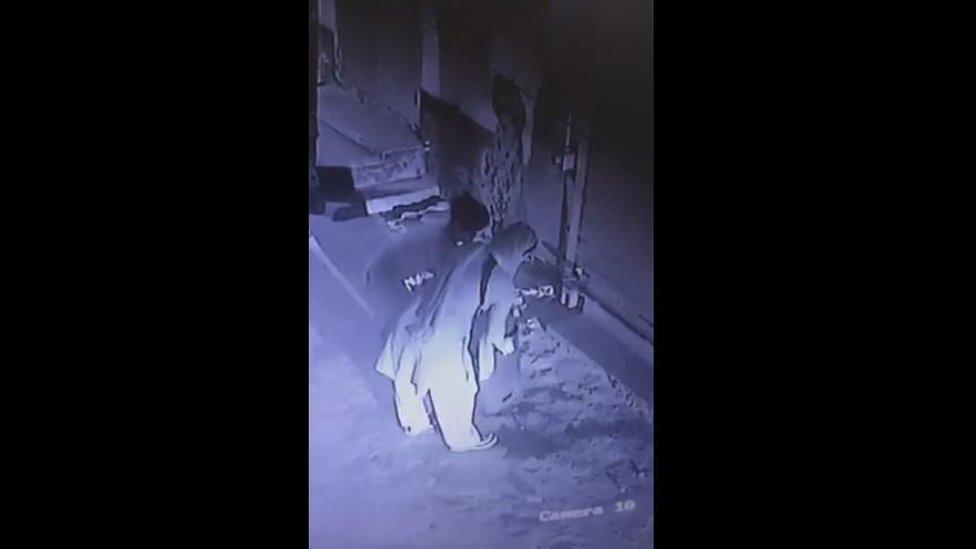
Footage shows two women in the family carrying stools into the house
Footage from 28 June shows Lalit Chundawat bringing wood into the house for the supposed ritual.
A CCTV camera installed in the house across the street recorded some activity between 10pm and 11pm on 30 June, which showed Chundawat family members bringing five stools and several wires into the house.
No outsider was seen entering the house until 6am on 1 July.
The first visitor the following morning to the house was the milkman followed by a neighbour, Gurcharan Singh, who discovered the bodies and raised the alarm.
So that leaves the hours until dawn, during which time what happened is still largely a mystery.
For the many different TV channels and reporters continuing to flock to find new angles, the story of the Chundawats has taken on the characteristics of a macabre thriller.
- Published2 July 2018
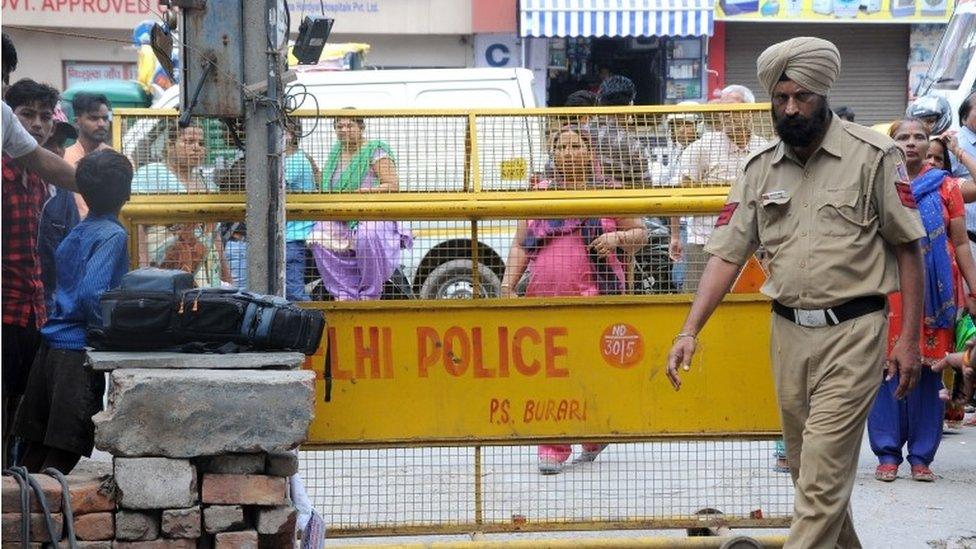
- Published2 July 2018
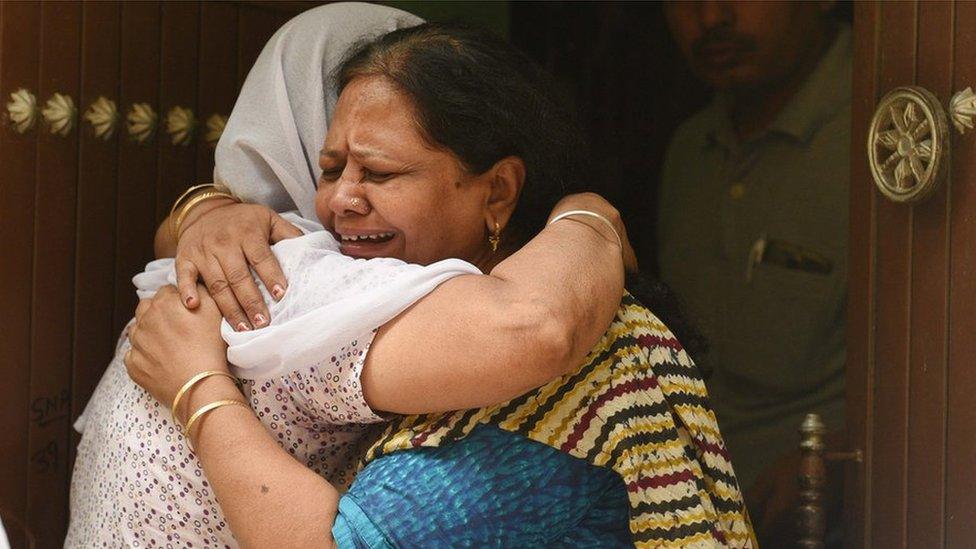
- Published5 July 2018

- Published25 November 2013
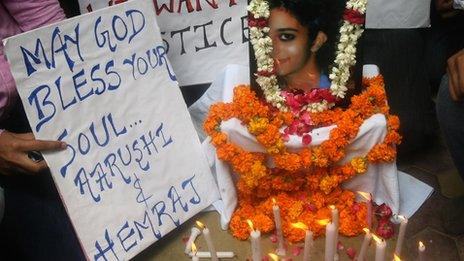
- Published2 September 2015
